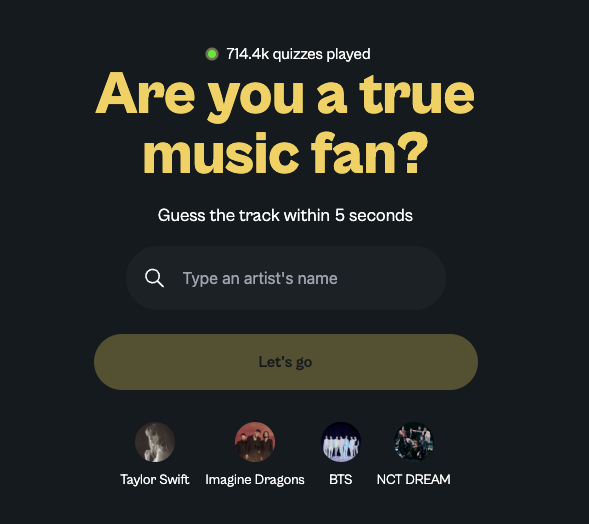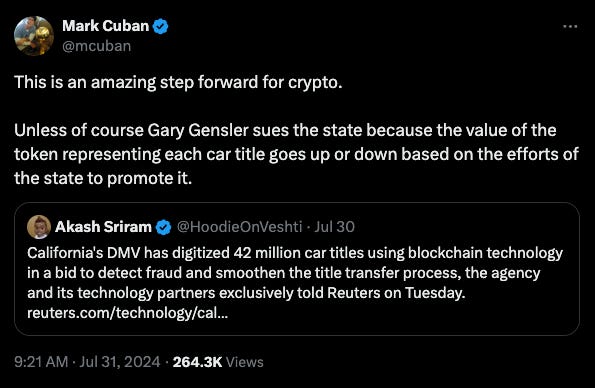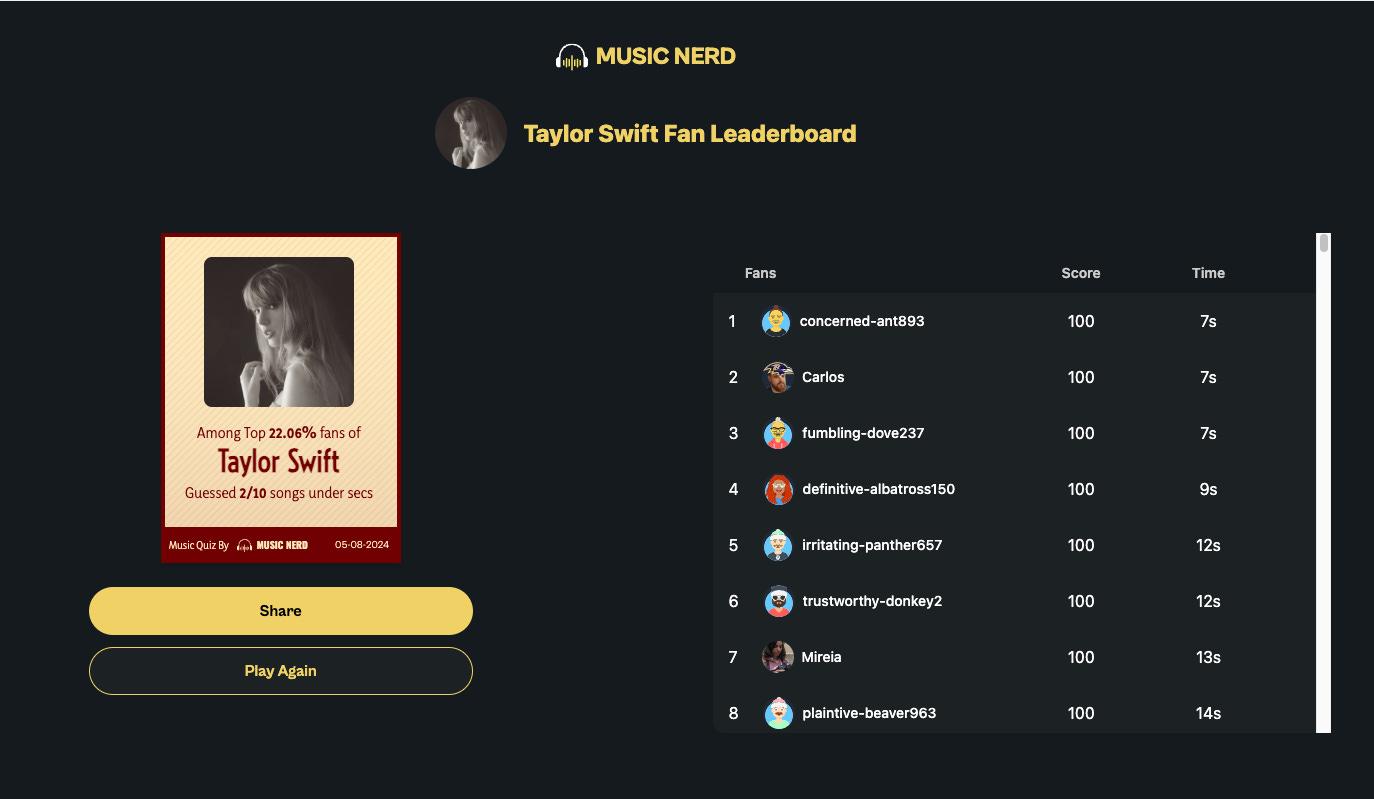California's Blockchain Push 💡
California DMV put 42M car titles on the blockchain network. Global leader in tech innovation, will California's adoption of blockchain for vehicles set an example for other states and governments?
Hello, y'all. For the music fans by the music lovers. Give it a go, will ya?👇
Blockchain’s allure and the utility has always been beyond cryptocurrencies.
Finance, healthcare, real-estate, cyber-security, logistics and almost all industries with information systems built on data.
Blockchain is the promise of decentralisation in a centralised world.
Efficiency and transparency built on a public utility system? Blockchains.
If blockchains have to truly emerge as infrastructure for the modern world, it needs mass adoption.
If mass adoption is what the end goal is, governments play a big role.
For governments bring in the reach, access and validity.
Now, the state of California is leading the charge.
How? By putting 42 million vehicle titles on the blockchain.
Dealing with the DMV isn't usually fun.
In California, it’s got a whole lot smoother, and more secure.
California's DMV is slashing transfer times from weeks to minutes.
The California Department of Motor Vehicles (DMV) has digitised 42 million car titles on the Avalanche (AVAX) blockchain in partnership with Oxhead Alpha.
Pushing the broader trend of tokenising real-world assets (RWA) on blockchains.
Benefits? Users can claim, track, and manage digital titles without visiting a DMV office.
Now, instead of waiting in long lines, Californians can manage vehicle titles through a simple mobile app.
This move isn't just about convenience.
The blockchain's core feature—an immutable ledger—makes it nearly impossible for bad actors to tamper with records.
This helps curb lien fraud.
What is that? Lien fraud occurs when a seller falsely claims that a lien (a legal claim or hold on a property due to a debt) on a vehicle has been released when, in fact, it hasn't.
Misleads buyers into purchasing a vehicle that still has an outstanding loan or financial claim against it.
With the new system, once a car title is on the blockchain, it can’t be altered or forged.
Makes it harder for fraudsters to falsely claim lien releases, as all transactions are verifiable.
For years, blockchain enthusiasts and crypto bros have pushed for such real-world applications.
John Wu, President of Ava Labs:
“Blockchains are the most advanced tool any organisation can leverage to maximise efficiency, maintain compliance and protect consumer data – vital components for a government serving its constituents. Today’s landmark announcement is a clear-cut example of how blockchain technology simultaneously benefits enterprises and consumers and Ava Labs is proud to partner with the California DMV as it transforms essential services to create a more transparent, accessible and secure user experience for citizens.”
The Quiz Game For The Music Lovers
Musicnerd.io - is more than just a platform; it's a journey into the world of music.
It provides an interactive experience through quizzes and exploration tools. For artists it’s a powerful tool for artists to connect with their fans.
Through custom quizzes artists can engage their audience, receive direct feedback, and build a loyal following eagerly anticipating their next release.
The platform offers a direct line to fans, fostering a sense of connection that goes beyond mere listening.
All of this thanks to Governor Gavin Newsom’s 2022 “Blockchain Executive Order.”
Which, focuses on seven priorities
Create a transparent and consistent business environment for companies operating in blockchain.
Collect feedback from a broad range of stakeholders, create a regulatory approach.
Collect feedback from a broad range of stakeholders for potential blockchain applications and ventures.
Engage in a public process and exercise statutory authority to develop a comprehensive regulatory approach.
Engage in and encourage regulatory clarity.
Explore opportunities to deploy blockchain technologies to address public-serving and emerging needs.
Identify opportunities to create a research and workforce environment.
Quite an easy way to adopt?
With vehicles, yes.
Take real estate for example. Using blockchain for real estate could streamline costs and offer huge benefits.
But, the complexity of these transactions - thanks to numerous stakeholders, contracts, and regulations -has made adoption slow.
So, vehicles make an ideal starting point.
Government Blockchain Association executive director, Gerard Dache.
“Property transfers like vehicles are similar to real estate transactions, but they are far less complex.”
It's the shift in how we think about ownership and authority.
What’s usual? Relying on big government databases and offices to manage property records.
But with blockchain, that authority could move to a decentralised system managed by a community of stakeholders.
Dache calls this a shift from “government to governance,” which could revolutionise how we handle property and transactions.
The California project isn’t the world’s first blockchain-based property transfer protocol by any means.
Given its scale and prominence, it could become one of the most impactful.
Independent research consultant James McKay.
“This is a significant development for the broader blockchain space to the extent that it is the first time we have seen a major economic centre in the US especially roll out a blockchain-based system. The scale of this project is what stands out to me as it’s significantly higher from a volume standpoint than other initiatives rolled out for land registry and other related areas, like Sweden’s ‘Lantmäteriet’ blockchain system.”
California is not alone in using blockchain for the government’s benefit.
India: Actively deploying blockchain technology for several applications
Land registration: Making land ownership records crystal clear and fraud-proof.
Digital certificates: Issuing secure certificates for education and other credentials.
Customs and taxation: Streamlining processes with automated systems to ensure compliance.
In December 2021, India rolled out a "National Strategy on Blockchain," with big plans to integrate blockchain across sectors like healthcare and e-governance, aiming to have a full national blockchain framework by 2027.
Public grievance systems: In India, the Uttar Pradesh government has teamed up with Polygon to create a blockchain-based public grievance system. This system is all about making sure citizen complaints are handled transparently and quickly.
2. Switzerland: In 2021, implemented a blockchain-based system to streamline their business registration process. It’s part of the broader Distributed Ledger Technology (DLT) Framework, which came into effect on August 1, 2021.
3. United Nations: The UN’s World Food Program is using blockchain to make sure food aid gets where it’s needed—no funny business.
Their platform, Building Blocks, runs on Ethereum and tracks food assistance. Ensures that every bit of aid is delivered correctly and accounted for, cutting down on fraud and boosting accountability.
4. Dubai, UAE: Integrated blockchain into their judicial system with the Court of Blockchain. This initiative is shaking up legal processes, making them faster and more transparent, and saving the city loads of time and money.
5. Tennessee, USA: In 2018 passed a law that recognises blockchain-based smart contracts as legally binding. This move opens the door for blockchain to be used in all sorts of governmental processes, from public contracts to electronic transactions.
6. US General Services Administration (GSA): The GSA is exploring blockchain to make federal operations smoother, especially in managing contracts and delivering foreign aid. They’ve even hosted forums to chat about how blockchain could benefit government processes—keeping things fresh in the world of bureaucracy.
7. Health sector initiatives: Health agencies, including the CDC in the U.S., are tapping into blockchain to beef up the security and privacy of sensitive health information. It’s a smart move to ensure data collection and management are top-notch and tamper-proof.
Token Dispatch View
Blockchain offers unbeatable transparency. Streamlines complicated process. Boosts security by turning sensitive data into a fortress that’s tough to breach.
It makes fraud and shady dealings a difficult bridge to cross.
Bureaucratic red tape? Blockchain’s smart contracts can handle licences and payments in a snap. Plus, it cuts out middlemen.
And what all governments and traditional systems lack? All of this.
As more governments get in on the action, it will improve efficiency and accessibility within public sectors.
California's adoption of blockchain in the DMV sets an example for other states and government agencies to follow.
Week That Was 📆
Saturday: A $235B Dead-Cat Bounce? ⛹️♂️
Friday: Crypto's $200M Election War Chest 🪖
Thursday: $2B to $125M. Ripple Victory? ✌️
Wednesday: Hey Crypto, Let's Walz Now? 🧐️
Tuesday: Carry Trade Crash? 💥
Monday: Why Are We crashing? 🚨
Week in Funding 💰
Vessel. $10M. On-chain exchange platform for spot trading, perpetual trading, and an AMM DEX, ensuring an unparalleled trading experience for users.
Tonx. $4M. SuperApp platform layer that empowers builders to create the new Web3 economy.
Khalani Network. $2.5M. Open permissionless solver collaboration platform, for developers to seamlessly onboard expressive and always-on solving capacity.
Nexio. $2.2M. Bitcoin Rollup network to solve smart contract vulnerabilities in EVM-based scaling solutions and multi-signature bridge designs
Televerse. $1M. Developer gamekits and gamebox platform to enable Web 2 developers to bridge and publish games to Telegram and integrate blockchain.
If you like us, if you don't like us .. either ways do tell us✌️
If you dig what we do, show us love on Twitter, Instagram & Threads🤞
This is The Token Dispatch 🙌 find all about us here 🤟
So long. OKAY? ✋










